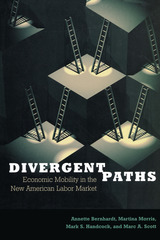2 books by Morris, Martin

Divergent Paths
Economic Mobility in the New American Labor Market
Annette Bernhardt
Russell Sage Foundation, 2001
The promise of upward mobility—the notion that everyone has the chance to get ahead—is one of this country's most cherished ideals, a hallmark of the American Dream. But in today's volatile labor market, the tradition of upward mobility for all may be a thing of the past. In a competitive world of deregulated markets and demanding shareholders, many firms that once offered the opportunity for advancement to workers have remade themselves as leaner enterprises with more flexible work forces. Divergent Paths examines the prospects for upward mobility of workers in this changed economic landscape. Based on an innovative comparison of the fortunes of two generations of young, white men over the course of their careers, Divergent Paths documents the divide between the upwardly mobile and the growing numbers of workers caught in the low-wage trap. The first generation entered the labor market in the late 1960s, a time of prosperity and stability in the U.S. labor market, while the second generation started work in the early 1980s, just as the new labor market was being born amid recession, deregulation, and the weakening of organized labor. Tracking both sets of workers over time, the authors show that the new labor market is more volatile and less forgiving than the labor market of the 1960s and 1970s. Jobs are less stable, and the penalties for failing to find a steady employer are more severe for most workers. At the top of the job pyramid, the new nomads—highly credentialed, well-connected workers—regard each short-term project as a springboard to a better-paying position, while at the bottom, a growing number of retail workers, data entry clerks, and telemarketers, are consigned to a succession of low-paying, dead-end jobs. While many commentators dismiss public anxieties about job insecurity as overblown, Divergent Paths carefully documents hidden trends in today's job market which confirm many of the public's fears. Despite the celebrated job market of recent years, the authors show that the old labor market of the 1960s and 1970s propelled more workers up the earnings ladder than does today's labor market. Divergent Paths concludes with a discussion of policy strategies, such as regional partnerships linking corporate, union, government, and community resources, which may help repair the career paths that once made upward mobility a realistic ambition for all American workers.
[more]

German Dis/Continuities, Volume 96
Martin Morris
Duke University Press
The twentieth-century history of few countries has been so profoundly marked by breaks, discontinuities, and ruptures as has Germany’s—the radical breaks between the Wilhelmine empire, the Weimar Republic, and the National Socialist period; the “end of history” in 1945 and the dual reconstruction from “Year Zero,” followed by the reunification of post-1989 German. This special issue of South Atlantic Quarterly focuses on the many dimensions of these discontinuities—social, political, cultural, aesthetic, psychological, and physical—as well as the continuities that are equally, if less apparently, implied by them.
The contributions presented here include Fredric Jameson’s “Ramblings in Old Berlin,” Günter Grass’s “Lonesome Capitalism,” and Peter Weiss’s “Aesthetics of Resistance.” Among the topics discussed in the volume are the debate over Holocaust memorials in Germany and the significance of their connections to the German past, the problematic continuity that identifies the new unified Germany with the former Federal Republic; the dangers to women posed by the neoliberal project; the legacy of the avant-garde in today’s media theory; Ars nova and Doktor Faustus; nostalgia for the old German Democratic Republic; and reflections on traumatic memory and history as trauma.
The contributions presented here include Fredric Jameson’s “Ramblings in Old Berlin,” Günter Grass’s “Lonesome Capitalism,” and Peter Weiss’s “Aesthetics of Resistance.” Among the topics discussed in the volume are the debate over Holocaust memorials in Germany and the significance of their connections to the German past, the problematic continuity that identifies the new unified Germany with the former Federal Republic; the dangers to women posed by the neoliberal project; the legacy of the avant-garde in today’s media theory; Ars nova and Doktor Faustus; nostalgia for the old German Democratic Republic; and reflections on traumatic memory and history as trauma.
Contributors. Ulrich Baer, Michael Geyer, Günter Grass, Frigga Haug, Julia Hell, Fredric Jameson, Juliet Koss, Andreas Michel, Martin Morris, Arkady Plotnitsky, Pierra Vidal-Naquet, Peter Weiss, James E. Young
[more]
READERS
Browse our collection.
PUBLISHERS
See BiblioVault's publisher services.
STUDENT SERVICES
Files for college accessibility offices.
UChicago Accessibility Resources
home | accessibility | search | about | contact us
BiblioVault ® 2001 - 2024
The University of Chicago Press









